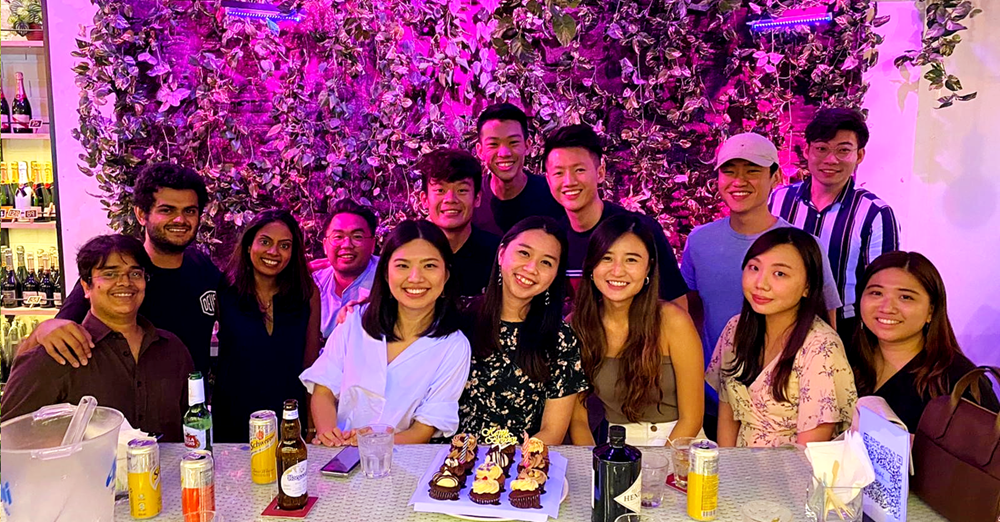“Working at Synpulse instilled a sense of discipline in me. If I’d started WhyQ right out of college, I wouldn’t have had the discipline to keep the company running.” Synpulse Alumnus and WhyQ CEO and Co-Founder, Varun Saraf, shares his journey to setting up food delivery start-up, WhyQ.
Hawker food is synonymous to Singapore’s food culture and is arguably one of the city-state’s most recognisable culture and heritage. Hawker centres house numerous food stalls selling local and foreign cuisines. It isn’t uncommon to see office workers patiently queuing for thirty minutes or more for delicious and affordable meals in their business attires, often in the sweltering heat that is typical in Singapore’s climate.
It’s also the love for hawker food that led to the development of WhyQ, the brainchild of Synpulse Alumnus Varun Saraf and his co-founder, Rishabh Singhvi. WhyQ is a digital hawker ecosystem that connects hawkers digitally to customers and suppliers, allowing them to deliver cooked food and order raw material supplies at a cheaper cost.
The beginnings
After graduating from the Singapore Management University (SMU), Varun worked in Credit Suisse as a business analyst for three years before making the move into the world of management consultancy at Synpulse.
However, even as he toiled away in the financial services industry, his childhood dream of running his own business was always at the back of his mind. Being born into a family of entrepreneurs, Varun had front-row seats to the highs and lows of running a business. While he was cognizant of the hardships involved, his goal to become an entrepreneur and his love for technology meant he was always on the look-out for an opportunity to establish a tech start-up.
The clash of the old and new: Hawker food and technology
That opportunity made itself present when he discovered the hawker culture in Singapore. Hailing from India, Varun was amazed by the variety and affordability of hawker food and the willingness and patience of office workers in Singapore’s Central Business District (CBD) to queue for food.
“I love the food, but I wasn’t ready to queue 30 to 40 minutes for a plate for chicken rice,” he says. Hawker food, to Varun, was often inconvenient especially during the lunch hour in CBD with the long waiting time.
He and his co-founder also noticed that hawker food service had no automation and few delivery options. Recognising the gap in the market and an untapped business opportunity, the idea of developing a hawker delivery platform that allowed users to pre-order or schedule their meals for delivery was born.
The duo designed a special batch-based delivery model, where orders are aggregated and delivered in batches to reduce their delivery costs significantly. These cost savings is translated into their delivery charges, allowing them to have one of the lowest cost-per delivery in the market.
Facing the challenge: Communication
No start-up journey is complete without its challenges. While the lack of a stable income was initially a challenge for Varun, it soon became clear that communication was the biggest challenge they faced.
Varun shares: “My co-founder and I are both Indians, and we were entering the hawker space where many stallholders mainly speak Mandarin and are technology averse. We can’t speak Mandarin and trying to explain the concept that food can be placed on a delivery platform, which was still alien to them in 2016 and 2017, was a huge struggle.”
The duo tackled this by speaking to many hawkers before identifying a small group who was willing to participate in the pilot. Soon, word spread, and more hawkers became interested to join the platform when they realised that WhyQ was helping the hawkers generate additional revenue.
The entrepreneurial path was also very different from what he was used to. As a two-man team, he and his co-founder were involved in everything from customer support, where they had to deal with customers angry with the waiting time as they ironed out processes and system glitches, to being on the ground coordinating deliveries.
Sharing an anecdote of WhyQ’s early days, Varun says: “I went from going to One Raffles Quay to work at a client’s office in a tie every day, to standing outside of One Raffles Quay, distributing flyers to the same clients I used to work with while I was at Synpulse. I had people coming up to me, asking me what had happened. Did Synpulse fire me?”

The Synpulse factor
Since the launch of WhyQ in February 2017, the tech start-up has grown into a team of 40 people in Singapore and India, raised S$5 million in funding, acquired their competitor Plum’s customer and hawker base, and scored partnerships with many big-name firms. Today, the start-up is Singapore’s largest hawker food delivery service with over 220,000 customers, delivering 3,000 meals from 2,500 hawker stalls daily, and an annual revenue run rate of S$10.8 million.
Varun credits part of his success as an entrepreneur to the sense of discipline his time as Synpulse consultant had instilled in him. “If I’d started WhyQ right out of college, I wouldn’t have had the discipline to keep the company running. It would have been much more challenging,” Varun says.
As a consultant, he also developed a mindset that pushed him to always look for solutions, which helped him greatly whenever he encountered roadblocks. The presentation and communication skills he gained also benefited him. As a start-up, Varun and his co-founder are always in search for funding, so having the skills in pitching and creating engaging pitch decks is crucial. Varun explains: “My experience as a consultant at Synpulse helped me develop different and better viewpoints as we communicate with and pitch to our investors.”
The start-up, entrepreneurial mindset and culture at Synpulse aided with his transition from consultant to business-owner too. Hearing the stories of how Synpulse Managing Director and Managing Partner Yves Roesti came to Singapore and built the Asia business from ground up was also inspirational to him.
And when asked about what was most memorable for him at Synpulse, Varun fondly recalls the family-like culture and the times he spent with his team-mates and colleagues.
Working at Synpulse instilled a sense of discipline in me. If I’d started WhyQ right out of college, I wouldn’t have had the discipline to keep the company running. It would have been much more challenging.
Life during COVID
As is the case for everyone, the COVID-19 pandemic has caused significant changes to Varun’s lifestyle. WhyQ saw a surge in demand and opportunities during the pandemic which made him even busier than before.
It brought a change in working style for him too. Before the pandemic, Varun often travelled and worked remotely even if it was just for three or four days. The change in pace and scenery was refreshing for him and helped him to cope with the pressures and demands of being an entrepreneur.
As an entrepreneur and being in the industry that he’s in, Varun acknowledges that he’s always busy and weekends no longer exists for him as he’s always working on something new. But even so, he finds it rewarding and wouldn’t trade it for anything else.

Connect with Varun via his LinkedIn profile.
Have a query? Reach out to the Synpulse APAC Alumni Team here.
